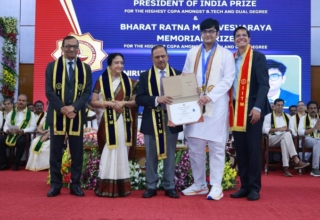
By Autar Nehru
In the last (about) two months of prolonged election campaigning, the residue memory, like any course program, isn’t about the content (read developmental issues), but a few social media aha viral moments, a few speech comments, ‘festive offers’ and of course a bharat darshan/discovery of sort on TV and newspapers.
Even among the developmental issues, ‘education’ is like the last child in the family, counted and loved affectionately but never taken seriously in main discourse. So, in this campaigning too, education as a plank didn’t get any traction. In fact, if anybody is serious to know education can be bettered through governance then Punjab state is a candidate not under the current government but the one before it. The state government led by Captain Amarinder Singh did initiate that transformation and yet his own party perhaps not valuing his contributions removed him just before elections. Had it been highlighted and politicized, the other narratives about Punjab wouldn’t have grown in fear as much they have now.
Anyway, as we move to new expectations from a new Government at the centre, making any suggestions or demands at this stage, is just academic. A better option will be reacting to what the Government reveals about its plans. At the same time, now, is perhaps an opportune time to initiate a parliamentary debate on education, so that a national thought process on how to navigate through the unmet challenges of education can be initiated for solutions including any amendments to existing laws because the route to Viksit Bharat 1947 vison has to pass through the corridors, classrooms and playgrounds of the schools and colleges.
As some of the issues raised in this election by many people didn’t get space, airtime and mention, naturally these like undeveloped saplings will die down or seed again next season after five years. That will be missed opportunity as this is a time to come together for India first.
School education, for sure must be stimulated after recognizing the challenges. One compelling story is told by a youth activist from a hinterland on child labor, how it is a vicious cycle for a segment of children, who anyway don’t have control over things at that age.
The journey of child labor as per the activist begins with the fact that a first-generation student doesn’t get parental attention. Born in poor families, both parents often go to work and being uneducated themselves, they offer no handholding to this child. In absence of good schooling/teachers, the child easily gets into bad company, idles here and there becomes acholic and eventually falls into trap of drug addiction. From here, if he is not getting money from home, he resorts to stealing. Now, everybody doesn’t turn a thief, most think of earning themselves.
Most parents and elders of these children encourage them to work and often give example of unemployed educated youth to dissuade them from studying. Another phenomenon purely human also happens alongside. Boys and girls get into romantic relationships. Families oppose. The couples elope. Therefore, migration by self-respect, encouragement of elders or compulsion takes them to cities, which in any case are full of difficulties for them. In the end, they land up in low paying and sometimes hazards menial jobs, never knowing they have surrendered their potential while entering into a world where their own children will have to undergo a similar fate.
And, if 2011 census figures are to be believed then some 8-9 crore children were out of school 13 years ago. We’ll get to know about its increase or decrease only after the next census happens. This is just one aspect of the issues children of this country are confronted with.
Affordable public education, both school and higher education, must remain a national priority. Quality education elements come from the right mix of infrastructure (includes teachers), pedagogies (includes outdoors, play) and policies. NEP 2020, in a way, is empowering for effecting changes for betterment of quality and engagement. The states and local bodies are the primary investors in good education but the new Government needs to bring a sharp focus on school education and create a buzz where everybody in the chain is not only sensitized and energized but sees himself or herself as a nation builder. Holistic development of children is fundamental to national development.
In the past a few decades school education in India has undoubtedly moved up several notches. From becoming a fundamental right to states investing in scalable improvement models, school education is undergoing a tremendous change at ground. Deficiencies and neglect of many years, in some places is too big reformed in short time, but a thinking is spreading that schools are important in our lives. So, there is a need to consolidate it for an action plan. Likewise, skills and higher education also carve for attention and need a forum like Parliament to express.










